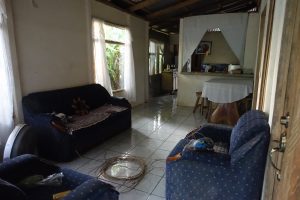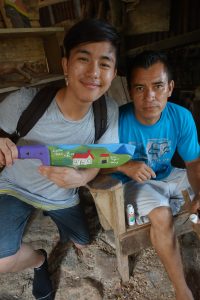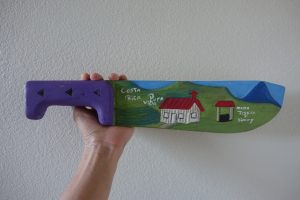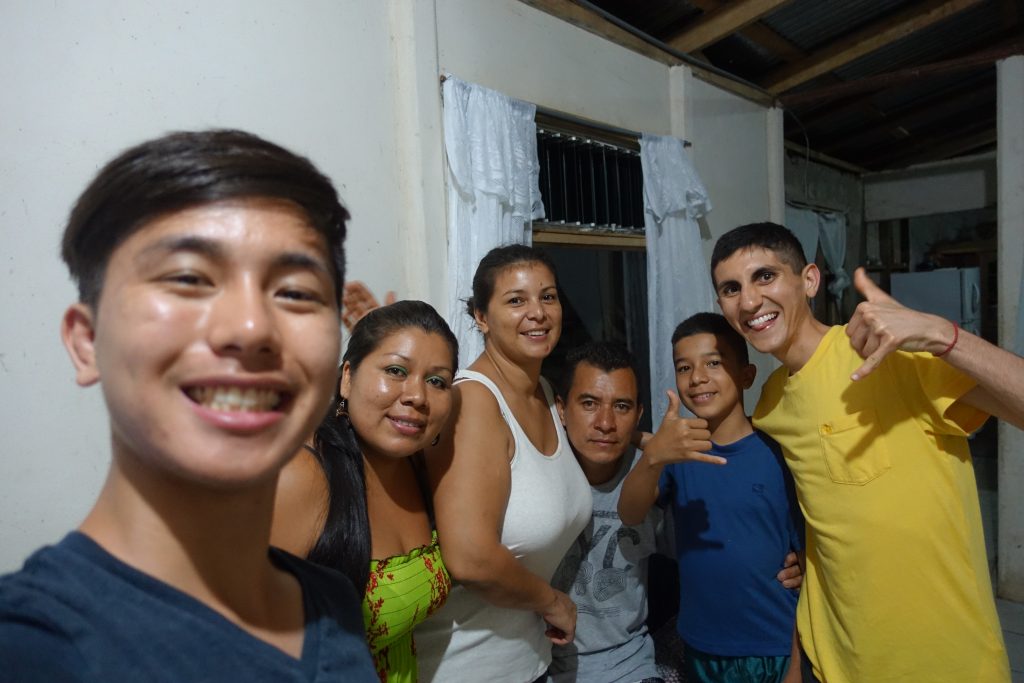“And they don’t speak any English”, our tour guides said to us as we were being assigned to homestay families. I was frightened to say the least.
This was going to be the first time during the trip that I would be separated from the rest of the team, and I spoke almost no Spanish. Luckily, I was partnered up with Lupe, one of the student coordinators, who could speak Spanish. But I was still worried about being unable to connect with my homestay family. I didn’t want to bother Lupe by asking him to translate for me every time I wanted to communicate. On the other hand, I didn’t want to just remain silent and lose the opportunity to connect with the locals and immerse myself in Costa Rican culture.
When Lupe and I were dropped off later that afternoon, our homestay father, Jimmy, was already standing outside to greet us. We entered the house and were introduced to his wife Jessica, his sister Flory, and his 8-year-old son Alex. The adults quickly gathered in the kitchen to finish up dinner while Lupe and I sat in the living area with Alex. Lupe and Alex began talking immediately while I sat listening intently but not understanding a word. I could already tell, however, that Alex was extremely comfortable around strangers. He smiled the entire time and his relaxed posture communicated cool, collected confidence as he spoke. Lupe kindly offered to help me translate some of the questions I wanted to ask.  But when he told me how to ask them in Spanish, I often had to ask him to repeat them and spell out some of the words. Although Alex and Lupe didn’t seem to mind, I felt rude constantly relying on someone else to help me communicate, and I soon felt anxious about how I would interact with the family for the rest of our stay. I was torn between being a burden every time I wanted to say something and missing out on connecting with the family.
But when he told me how to ask them in Spanish, I often had to ask him to repeat them and spell out some of the words. Although Alex and Lupe didn’t seem to mind, I felt rude constantly relying on someone else to help me communicate, and I soon felt anxious about how I would interact with the family for the rest of our stay. I was torn between being a burden every time I wanted to say something and missing out on connecting with the family.
During our conversation with Alex, Jimmy brought out a guitar from the back of the house and offered it to me and Lupe to play. Although I could not speak Spanish, I had taken guitar lessons and I seized on the opportunity to interact with our homestay family. As Jimmy sat himself on the couch next to me, I tuned the old instrument to the best of my ability and began playing whatever I could remember from classical pieces to songs I had learned during my lessons. Jimmy and Alex watched from the couch while the rest of the family listened from inside the kitchen. When I finished, the family happily applauded and said that they enjoyed the performance. I realized that even though we could not communicate directly through speech music was a language everyone could understand. It was the first pivotal moment of my stay and showed me that I didn’t necessarily have to speak their language to interact with them.
Things continued to get better even after dinner. Lupe and I sat with Alex in the living area watching professional wrestling on television. Alex would frequently laugh at certain people and cheer on others. When he saw a wrestler he liked, he called him, “la leche”, literally translating to “the milk”. Even Lupe was confused, and when he asked Alex what he had meant we found out that “la leche” was slang for “top notch” or “the best”. As Alex continued talking, he shared even more slang words with us such as “sapo” (nosy person) and “chancho” (pig). Both Lupe and I were learning these slang words for the first time, and it showed me that even though Lupe already knew the language, there were still aspects of Costa Rican culture that were new to both Spanish speakers and non-Spanish speakers alike. This idea became more apparent when Jimmy briefly joined us for a conversation. He wanted to practice his English and attempted to have a conversation with me. “Hi”, he said. I greeted him and asked how he was doing to which he hesitantly responded, “I’m good”. When I asked him what he had done that day, he laughed and said he couldn’t understand. In that moment, I saw that he was just as confused as I was whenever I attempted to speak Spanish, and I realized that despite our inability to directly communicate we were both trying our best to understand each other. What was even more impactful was that the family genuinely wanted to talk to both of us, even though it was difficult to communicate with me.
The next day we were regrouped with the rest of the team to do service work, but all I could think about was when we would be able to return to our homestays. When the time finally came I was eager rather than nervous like I had been initially. During dinner we had a chance to connect with Jessica, Jimmy’s wife, and Flory, Jimmy’s sister, more personally. When Lupe began talking to them, I once again felt a little bit awkward as I could not understand. But with Lupe’s help I was able to tell them a little bit about myself and heard some of their stories as well. They were both understanding and friendly the entire time and were curious about our lives. Despite the fact that we had only been there for a day, they told us to think of this as our home in Costa Rica and that we could call them Mama Jessica, Aunt Flory, and Papa Jimmy. Alex later came behind me and Lupe during our conversation, put his elbows on our shoulders, smiled at each of us, and said, “Hermanos Lupe y Kiet!” (Brothers Lupe and Kiet) before walking into the kitchen. I soon began to feel comfortable again and was glad to have been placed in a homestay family that was so welcoming and put so much effort into making us feel like part of the family.
We had hardly spent two days at our homestay when we had to leave the next morning. Yet, I felt more connected with the family than with others who I had known for much longer.  Though we had not been able to speak to eachother directly, I felt like I had gotten to know Jimmy, Jessica, Flory, and Alex through other means of communication whether that was through playing music or laughing at a TV show. Before leaving Mastatal, we decided to stop by the house one last time. Jimmy was a wood carver and sold his carvings out of a little area in front of his house. Lupe and I had chosen which carvings we wanted to buy and requested that Jimmy write his and his wife’s names on them to commemorate our stay. After one last goodbye, I picked up my carving (a machete) and read the painted words, “Mama Jessica y Jimmy”. Despite being unable to speak Spanish, I had been able to interact and connect with the family even more powerfully than with others in my life who I have been able to talk to. Even though we were leaving, I would always have this carving to serve as a testament to what I had learned during my stay. It’s a reminder that communication doesn’t necessitate speech, but rather simply involves an attempt to understand one another beyond the language barrier.
Though we had not been able to speak to eachother directly, I felt like I had gotten to know Jimmy, Jessica, Flory, and Alex through other means of communication whether that was through playing music or laughing at a TV show. Before leaving Mastatal, we decided to stop by the house one last time. Jimmy was a wood carver and sold his carvings out of a little area in front of his house. Lupe and I had chosen which carvings we wanted to buy and requested that Jimmy write his and his wife’s names on them to commemorate our stay. After one last goodbye, I picked up my carving (a machete) and read the painted words, “Mama Jessica y Jimmy”. Despite being unable to speak Spanish, I had been able to interact and connect with the family even more powerfully than with others in my life who I have been able to talk to. Even though we were leaving, I would always have this carving to serve as a testament to what I had learned during my stay. It’s a reminder that communication doesn’t necessitate speech, but rather simply involves an attempt to understand one another beyond the language barrier.
Written by Kiet Nguyen

